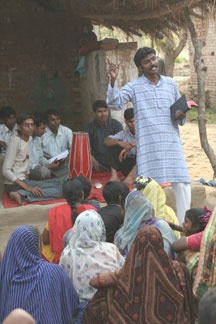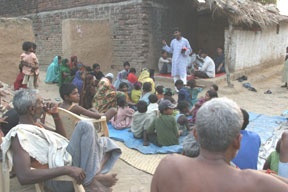|
|
The year was 1488. A young boy accidentally left a wooden shape dripping with dye on a piece of parchment overnight. In the morning he discovered an image remaining after removing the wood. It was an “aha!” moment that led to the invention of the printing press. That one insight changed the world in which we live. The boy’s name was Johann Guttenberg and his idea lit the fuse on a literacy revolution that supercharged the field of knowledge. The Bible finally came within reach of the common man. Christianity in Europe flourished. For the next five hundred years the Church in Western societies trumpeted the superiority of literacy.
I had thought for so long that the Guttenberg revolution was a worldwide phenomenon. I grew up thinking that literacy was the one thing the world needed to level the playing field for everyone. Then one day I made an alarming discovery: five hundred years after the invention of the printing press only thirty-three percent of the world are truly literate. This stopped me dead in my tracks. Imagine the banner headline: “Approximately sixty-seven percent of the people of the world are non-literate oral learners! Read all about it!”
If you printed that headline in every newspaper in every country of the world, in every language known to humanity and you threw it on the coffee table of every home on earth, close to four billion people could not read it!
Let me ask you, if you had a business and you found that sixty-seven percent of your target audience were non-literate oral learners, would you tailor your business plan, dedicate your work force and allocate a huge portion of your operating budget especially to reach them? Of course you would! That’s just smart business. Then why are missions not doing this to reach oral learners?
Oral Learners and the Great Commission
The world of missions is just now waking up to the fact that oral learners are the bull’s eye at the center of completing the Great Commission. There are four billion oral learners in the cross-hairs of redemptive history at the beginning of the twenty-first century. What are you, your church and your mission agency doing to hit the bull’s eye?
If the term “oral learner” is unfamiliar to you let me offer a simple definition. By oral learners we mean those people who learn best and whose lives are most likely to be transformed when information comes to them through oral, not literate, means. Oral learners transmit their beliefs, heritage and values by means of stories, drama, songs and proverbs. They have built their customs, culture and social fabric around storytelling.
What does this mean for us as we endeavor to fulfill the Great Commission? We must start asking questions such as: How in the world do we share the word of God with people who can’t, don’t or won’t read? Or with those who don’t write? Or with those who may not even have a written language?
![]() Listen to this story from a young Christian leader in Bihar, India:
Listen to this story from a young Christian leader in Bihar, India:
“I come from village culture. I want to tell you what it is like there. Most of the people in the villages are non-literate. Village people take interest in stories, in music and in drama. In the village in the evening time people meet in the street, tell stories and sing village songs. They learn lessons from these stories and they put them into practice in their lives. They have never read a book; they never have been to school. They are not literate, but they listen and then they learn.
I come from a Hindu family. In my childhood I used to join in Hindu customs. I listened to many Hindu stories. But when I reached sixth standard in the school I had a chance to hear the stories of Jesus. I had never heard such stories. I had been taught that there were many gods, but through the stories of Jesus I came to understand that Jesus is the true God. I committed my life to the Lord and began to tell people about Jesus.
After some time I went to Bible College to learn the word of God. There I was taught a literate Western style of education. When I came back from the college I used the same Western methods to preach the gospel but nobody accepted Christ. I was very discouraged and I was thinking I would leave the ministry. Then I got the opportunity to learn how to communicate with oral cultures through training provided by Scriptures In Use. I learned how to share my faith and plant churches among non-literate people. I was influenced by the teaching and returned to the mission field and started using the same storying method. So many people believed in Jesus Christ through this method.
I witnessed so many souls coming to Christ by telling stories from the Bible. So many souls are being saved! I am now training many missions workers throughout Bihar. The training is going well; every month many people are accepting Jesus Christ. Each month five hundred to six hundred people are taking baptism and fifty new churches are being planted. Through the cooperation of several ministries, a church planting movement is taking place throughout Bihar.”
|
|
This Changes Everything
Brace yourself for this headline: “An estimated ninety percent of the world’s Christian workers present the gospel and do discipleship using highly literate communication styles.” Ninety percent! Throw that up against the sixty-seven percent who are oral learners and for whom literate communication makes little sense, and what do you have? A strategic problem.
Let me put it this way. We can try all day to install software on a Macintosh computer, but if the software is designed for a Windows only PC we will be out of luck. We can know that our customers need software. We can spend big bucks on designing great software. Our investors may be excited about the software. But it all means nothing if when we go to install it on our customer’s computer, we find out that two-thirds of them are using an incompatible operating system. Oral learners do not have a literate operating system. They need different software and this is what that young leader in India discovered. That one single insight should rock our world as it did his. It should shock Christian leadership. It should change our mission strategies for sharing faith, training leaders and planting churches. It should radically change the focus of our Christian stewardship.
Fulfilling the Great Commission Among Oral Learners
How do we fulfill the Great Commission among oral learners? We change our approach just as that man in Bihar did. He simply learned to use the stories of the Bible to communicate in a way that functionally illiterate people relate to and understand. It seems so obvious and so simple.
![]() He put away his printed books and tracts. He stopped communicating abstract theological ideas that he had learned in Bible school. He started telling the stories of the Bible to cross natural bridges into the lives of his listeners. He used stories from the Bible to bring forth truths that challenge the worldview of the people in his culture. Then he watched the Holy Spirit speak through these stories.
He put away his printed books and tracts. He stopped communicating abstract theological ideas that he had learned in Bible school. He started telling the stories of the Bible to cross natural bridges into the lives of his listeners. He used stories from the Bible to bring forth truths that challenge the worldview of the people in his culture. Then he watched the Holy Spirit speak through these stories.
The fact that literate, print-oriented, missionaries from the West have missed this oral storying method for so long may be one of the single most serious tactical mistakes we have made in the last two hundred years. I grieve over all the time, energy and funding that I have personally directed toward print evangelism mission endeavors that missed the mark for oral learners.
I finally began to understand. Literacy software does not fit two-thirds of the world’s population. Until we wake up to that fact, we will continue to expend manpower and resources in less fruitful endeavors, with inadequate tools and methodology. The result of this is that we miss our audience. We miss our opportunity to effectively share the stories of faith among oral cultures.
The development of oral strategies is not meant to detract from print evangelism or Bible translation. In fact, the opposite is true. The most comprehensive strategy for communicating the word of God in the heart language of an oral culture should start with an oral approach that leads to translation and literacy. The problem is, too often we get the cart before the horse. Or worse yet, we forget the horse completely.
Rethink, Recreate, Reproduce
I am convinced that if we take the unique needs of the oral learner to heart and if we make them a priority in shaping our mission strategies then we will make monumental progress in completing the Great Commission.
We urgently need ministries willing to rethink what they are doing, ministries willing to create new tools, new methodologies and new approaches that put the needs of oral learners first. In doing so God will enable us to harness the greatest force on earth for spreading the gospel and multiplying the Church—the power of his stories reproduced by word of mouth over and over again among each unique oral culture of the world in culturally sensitive ways. We need a movement of cross-cultural Bible story experts who have the skill to train people to engage unreached oral learners with a complete set of Bible stories in the local language that are tailored to transform their unique worldview. It is cost effective, reproducible and grassroots accessible.
The goal of the International Orality Network1 is to influence the body of Christ to disciple all oral learners. We envision nothing less than a word-of-mouth Bible storying revolution, tailored to the worldview and in the mother tongue of each oral culture of the world. This is our greatest hope for fulfilling the Great Commission among four billion people who have yet to hear the true story of salvation. It is a simple insight with world shaking possibilities.
What do you think, Mr. Guttenberg?
Endnote
1. The International Orality Network (ION) is an alliance of mission agency leaders partnering together to make God’s Word available to all oral learners in culturally appropriate ways. ION relates to the Lausanne Committee for World Evangelization and is committed to providing oral strategies to communicate the gospel, make disciples, train leaders and enable church planting movements among all peoples in ways that are reproducible by oral peoples.



